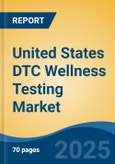Speak directly to the analyst to clarify any post sales queries you may have.
10% Free customizationThis report comes with 10% free customization, enabling you to add data that meets your specific business needs.
Key Market Drivers
Rising Consumer Awareness of Preventive Health
An essential factor driving the U.S. DTC wellness testing market is the increasing consumer awareness of preventive health practices. The market has witnessed a shift from reactive healthcare approaches to proactive wellness management. Influenced by the pandemic, consumers across various demographics have adopted healthier eating habits, with 40% prioritizing fresh produce and 33% avoiding artificial ingredients. Additionally, about 40% of consumers reported preparing more meals at home to control nutrition and ingredient quality. This shift in lifestyle is mirrored by growing interest in wellness testing services that empower consumers to monitor hormone levels, nutrient intake, food sensitivities, and more - all from the comfort of home. These behavior changes support long-term engagement with DTC wellness platforms, which offer actionable insights aligned with evolving personal health goals.Key Market Challenges
Regulatory Uncertainty and Compliance
The U.S. DTC wellness testing sector faces notable regulatory challenges, particularly in areas like genetic testing, hormonal assessments, and other health-related diagnostics. Despite being categorized as wellness tools rather than diagnostic products, many of these services operate within a regulatory gray area. The lack of standardized guidelines from bodies such as the FDA and FTC creates ambiguity, increasing the complexity and cost of compliance. Companies must navigate a fragmented regulatory landscape that includes federal, state, and local rules. As scrutiny over accuracy and health claims intensifies, firms are compelled to invest heavily in compliance teams, legal counsel, and product validation. These obligations can slow down product development and erode profitability. In cases of non-compliance, firms also risk fines, recalls, or reputational damage, adding further pressure to operate within evolving regulatory frameworks.Key Market Trends
Advancements in Personalized Health and Precision Medicine
The growing demand for highly personalized wellness solutions is shaping the evolution of the DTC wellness testing market. Consumers are increasingly seeking tailored health insights based on their genetic makeup, lifestyle, and environment. Companies offering genetic testing, hormone panels, and microbiome analysis are aligning with trends in precision medicine, using biomarkers and AI-driven platforms to generate personalized recommendations. These include customized nutrition plans, fitness regimens, and mental health support strategies. By integrating these services with digital apps and subscription models, companies are enhancing consumer engagement and enabling ongoing health tracking. The convergence of data-driven healthcare with consumer wellness is creating opportunities for innovation, differentiation, and long-term brand loyalty in this fast-growing segment.Key Market Players
- 23andMe Inc.
- Everlywell, Inc.
- Quest Diagnostics
- LetGetChecked (PrivaPath Diagnostics Ltd.)
- Kindbody
- Myriad Genetics, Inc.
- Laboratory Corporation of America Holdings
- Cue
- myLAB Box.
- Ro (Modern Fertility)
Report Scope:
In this report, the United States DTC Wellness Testing Market has been segmented into the following categories, in addition to the industry trends which have also been detailed below:United States DTC Wellness Testing Market, By Test Type:
- Hormone
- Micronutrients
- Food Intolerance
- Food Sensitivity
- COVID-19 DTC Test
- Infectious Disease Tests
- Other
United States DTC Wellness Testing Market, By Offering:
- Test Panel
- Test Strips
- Digital Monitoring Instruments
- Other
United States DTC Wellness Testing Market, By Distribution Channel:
- Online
- Over the Counter
United States DTC Wellness Testing Market, By Region:
- Northeast
- Midwest
- South
- West
Competitive Landscape
Company Profiles: Detailed analysis of the major companies present in the United States DTC Wellness Testing Market.Available Customizations:
With the given market data, the publisher offers customizations according to a company's specific needs. The following customization options are available for the report.Company Information
- Detailed analysis and profiling of additional market players (up to five).
This product will be delivered within 1-3 business days.
Table of Contents
Companies Mentioned
- 23andMe Inc.
- Everlywell, Inc.
- Quest Diagnostics
- LetGetChecked (PrivaPath Diagnostics Ltd.)
- Kindbody
- Myriad Genetics, Inc.
- Laboratory Corporation of America Holdings
- Cue
- myLAB Box.
- Ro (Modern Fertility)
Table Information
| Report Attribute | Details |
|---|---|
| No. of Pages | 70 |
| Published | July 2025 |
| Forecast Period | 2024 - 2030 |
| Estimated Market Value ( USD | $ 1.05 Billion |
| Forecasted Market Value ( USD | $ 1.91 Billion |
| Compound Annual Growth Rate | 10.4% |
| Regions Covered | United States |
| No. of Companies Mentioned | 10 |









